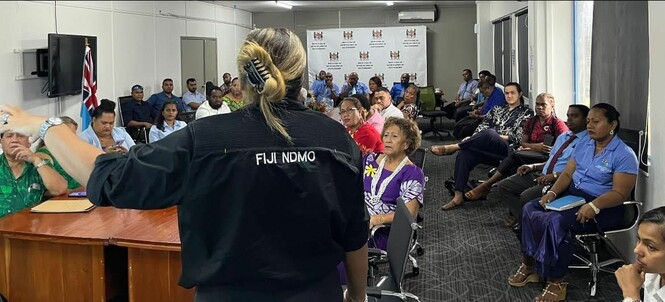
Held by the Fiji National Disaster Management Office to test and refine Fiji’s 2017 Tsunami Response Plan, ensuring a more efficient and coordinated approach in the face of a real disaster. It was also an opportunity for exchange participants to actively participate and learn from large-scale disaster preparedness and response activities.
The exercise involved participation of local communities, including hundreds of school children, raising public awareness of tsunami risks and preparedness measures. The involvement of community members in early warning and early action activities ensures they are fit for purpose and inclusive of everyone.
As part of the event, IFRC Disaster Law hosted a Pacific Peer Exchange on National Disaster Preparedness and Response Strategies, bringing together representatives from across the Pacific, from the Pacific Resilience Partnership Technical Working Group, national and international government representatives, Red Cross National Societies and other regional organizations, to observe the exercise.
The exchange provided a platform for collaboration and focused on advancing robust national disaster laws and integrating climate change adaptation and protection for vulnerable populations into relevant disaster-related legislation and policies.
Patience Vainerere-Maoate, from the Cook Islands Red Cross, took part in the exchange said that everyone has the right to protection and assistance during disaster preparedness and disaster response.
“I believe that having a disaster law and policy framework in place is important to ensure that everyone is safe and protected by our disaster actions.
“Having disaster law and policy in place not only protects our people, it also ensures that all sectors or agencies involved in disaster risk management meet the specific needs of our vulnerable groups as well.”
The Pacific Peer Exchange marks a significant step in enhancing regional disaster resilience. The sharing of knowledge and ideas across the Pacific is crucial in shaping a coordinated response that protects lives and livelihoods.
In the lead-up to the exercise, an Academic Session was held, where experts and thought leaders from across the region were invited to present on key topics related to disaster preparedness and response. Ernest Gibson, Senior Officer, Pacific Disaster Law and Advocacy at IFRC, presented on disaster law and the importance of its role within early warning early action initiatives and spoke about He also spoke to disaster law themes and International Disaster Response Law (IDRL).
Ernest said his presentation was to underscore the importance of integrating disaster law within national and regional legal frameworks and provided participants with examples of how this could be achieved.
“Underpinning every preparedness, response or recovery operation before and during a disaster, whether large or small, should be a network of laws, policies and plans which determine who does what, when and how.”
“The importance of ensuring these actions are enshrined in legal frameworks cannot be overstated. These laws ensure communities are prepared before a disaster strikes and facilitate faster and more effective response during emergencies.”
The exercise was the first of its kind in Fiji and reflects the commitment of the Fijian Government, NDMO, and other key stakeholders to enhance the nation's readiness to face natural disasters, particularly earthquakes and tsunamis.